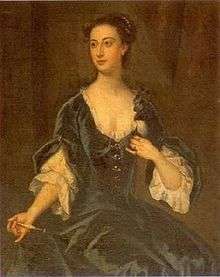John Vanderbank

John Vanderbank (9 September 1694, in London – 23 December 1739, in London)[1] was an English portrait painter and book illustrator, who enjoyed a high reputation for a short while during the reign of King George I, but who died relatively young due to an intemperate and extravagant lifestyle.[2]
Life
Vanderbank was born in London, the eldest son of John Vanderbank Snr. His father was a Huguenot tapestry weaver, born in Paris, but who was forced to flee to Holland before coming to England where he became head of a Soho tapestry weaving factory.[3]
Vanderbank studied under Sir Godfrey Kneller at James Thornhill's art academy in Great Queen Street from 1711 until 1720, when he joined with Louis Cheron to found his own academy in St. Martin's Lane. The venture proved a failure, and in 1729 he went to France to avoid his creditors. On his return he entered "the liberties of the Fleet" – mansion houses near Fleet prison, London, in which certain privileged prisoners could serve out their sentences in return for payment.[2]
It was noted by George Vertue that "only intemperance prevented Vanderbank from being the greatest portraitist of his generation." He died of tuberculosis in Holies Street, Cavendish Square, London, on 23 Dec. 1739, aged about 45, and was buried in Marylebone church.[2]
Works
Vanderbank's portraits, among which are those of many eminent persons, are skilfully drawn and full of character, but slight and careless in execution. He had a great talent for historical composition, and Vertue spoke highly of some of his works of this class.[2]
Vanderbank’s book illustrations include: the portrait of Sir Isaac Newton used in the frontispiece of the 1726 edition of Principia; the 66 plates of the first edition in Spanish of Cervantes' Don Quixote published in London (1738); and illustrations for 'Twenty-five Actions of the Manage Horse, engraved by Josephus Sympson (1729). His 1725 portrait of Sir Isaac Newton hangs in Trinity College, Cambridge. Many of his portraits were engraved by John Faber Jr. and George White. Vanderbank was amongst a group of artists painted by William Hogarth, of which there is an engraving by R. Sawyer.[2]
Selected works

| Subject | Date | Medium | Collection | Location |
|---|---|---|---|---|
| Charles Spencer, 3rd Duke of Marlborough | 1719 | Oil on canvas | British Government Art Collection | UK |
| Woman Visiting a Sorceress | 1721 | Pastel on paper | Courtauld Institute of Art Gallery | London, England |
| Sir Isaac Newton | 1725 | Oil on canvas | Trinity College | Cambridge, England |
| Samuel Clarke | National Portrait Gallery | London, England | ||
| George I | 1726 | Oil | Bowes Museum | County Durham, England |
| The Volte Renversee to the Right | 1728 | Engraving | Tate Gallery | London, England |
| Don Quixote Addressing to Goatherds | Oil on board | Tate Gallery | London, England | |
| George Lambert | 1729 | Oil | Cited by Waterhouse | |
| Edward Wortley Montagu | 1730 | Oil on canvas | British Government Art Collection | UK |
| John Harvey | 1732 | Oil on canvas | British Government Art Collection | UK |
| Queen Caroline | 1736 | Oil | Duke of Richmond and Gordon | Goodwood, Sussex, England |
| Woman in White | 1736 | Oil on board | Dulwich Picture Gallery | UK |
| A Youth of the Lee Family | 1738 | Oil on board | Tate Gallery | London, England |
| Woman in a Blue Dress | Oil on canvas | Private Collection | Ohio | |
| Charles Christian Reisen | Oil on canvas | |||
| Louisa Carteret | 1736 | UK | ||
References

- ↑ Waterhouse, Ellis. Painting in Britain 1530–1790 (Penguin Books, 1957).
- 1 2 3 4 5
 Lee, Sidney, ed. (1899). "Vanderbank, John". Dictionary of National Biography. 58. London: Smith, Elder & Co. p. 100.
Lee, Sidney, ed. (1899). "Vanderbank, John". Dictionary of National Biography. 58. London: Smith, Elder & Co. p. 100. - ↑ Amal Asfour, Paul Williamson. Gainsborough's vision (Liverpool University Press, 1999) p71.
External links
- 102 Painting(s) by or after John Vanderbank at the Art UK site
| Wikimedia Commons has media related to John Vanderbank. |
- J. Vanderbank online (ArtCyclopedia)
- J. Vanderbank biography (Philip Mould Fine Paintings)
- Historical portraits by John Vanderbank (Philip Mould Fine Paintings)
- Portrait of Miss Rachel Long (1737, oil on canvas)
- Portrait of a gentleman (Art Renewal center)